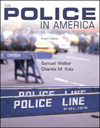 |  The Police in America, 4/e Samuel Walker,
University of Nebraska
Charles M. Katz,
Arizona State University-West
Police Work The Police and Crime
Chapter Overview| While crime control is one of the primary responsibilities of the police, several myths exist about the ability of the police to control and solve crimes. For example, the primary means of learning about crime is through citizen reports; police rarely discover crimes in progress. Therefore, citizens are considered the true "gatekeepers" of the criminal justice system. For various reasons, however, many citizens do not report crime, which makes the police task of fighting and solving crime difficult. The effectiveness of criminal investigation and its ability to clear crimes is also surrounded by myths about detective work.
This chapter introduces the student to the myths and realities of police work. Discussions concerning special investigative techniques used in undercover police work, drug and gun enforcement, and gang suppression are included. Other specific strategies to address crime problems--such as hate crime, school crime, terrorism and computer crime--are also addressed.
|
|



 2002 McGraw-Hill Higher Education
2002 McGraw-Hill Higher Education